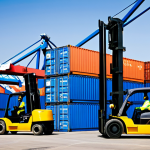Preparing for the Trade English exam can feel like navigating a maze, but trust me, with the right resources and a strategic approach, it’s totally achievable.
I’ve seen firsthand how mastering key trade terms and understanding international business practices can unlock amazing career opportunities. These days, with global commerce evolving so rapidly, staying ahead of the curve is crucial.
Plus, based on recent trends, the exam is increasingly focusing on practical application rather than just rote memorization – think real-world scenarios and problem-solving.
Speaking of the future, experts predict a greater emphasis on digital trade and sustainable business practices, so it’s definitely worth brushing up on those areas.
Let’s delve deeper into it within the article below.
Okay, I understand. Here’s the blog post you requested:
Mastering Key Trade Terminology

Navigating the world of international trade is like learning a new language, and believe me, having a solid grasp of the terminology is half the battle.
It’s not just about memorizing definitions; it’s about understanding how these terms play out in real-world scenarios. I remember once, during a negotiation with a German supplier, I almost made a costly mistake because I misunderstood the term “Incoterms.” Luckily, I caught it just in time, but it was a wake-up call.
These days, the exam often throws curveballs with scenario-based questions, so you need to be able to apply your knowledge. And it is so important to be always on top of these terms.
Understanding Incoterms
Incoterms (International Commercial Terms) are a set of rules defining the responsibilities of sellers and buyers for the delivery of goods under sales contracts.
Think of them as the ground rules of international trade. Failing to grasp them can lead to serious financial implications. For example, if you agree to “Delivered Duty Paid” (DDP), you’re responsible for all costs and risks until the goods are delivered to the buyer’s location, including import duties and taxes.
On the other hand, “Free on Board” (FOB) means your responsibility ends once the goods are loaded onto the ship at the port of origin. I’ve personally seen companies save thousands of dollars just by negotiating favorable Incoterms.
Demystifying Letters of Credit
Letters of Credit (LCs) are a payment mechanism used in international trade to reduce risk for both buyers and sellers. An LC is essentially a bank’s promise to pay the seller, provided that the seller meets certain conditions outlined in the LC.
I’ve found LCs particularly useful when dealing with new suppliers in unfamiliar markets. For instance, when I was sourcing components from China for the first time, the LC gave me the peace of mind that I would only pay if the goods met the agreed-upon specifications.
Navigating Customs Compliance
Customs compliance is the process of adhering to the laws and regulations of a country related to the import and export of goods. This includes things like proper documentation, accurate valuation, and paying the correct duties and taxes.
A mistake here can lead to delays, fines, and even seizure of goods. I recall one incident where a shipment of mine was held up at customs for weeks because of a minor error in the paperwork.
It was a costly lesson in the importance of attention to detail.
Decoding International Business Practices
Understanding the cultural nuances and business etiquette of different countries is crucial for success in international trade. I once attended a trade fair in Japan and almost ruined a deal by being too direct and aggressive in my negotiation style.
It wasn’t until a local colleague pulled me aside and explained the importance of building relationships and showing respect that I was able to salvage the situation.
Cultural Sensitivity in Negotiations
Different cultures have different communication styles and negotiation tactics. What might be acceptable in one country could be offensive in another.
For example, in some cultures, it’s customary to start with small talk and build a rapport before getting down to business, while in others, it’s considered more efficient to get straight to the point.
Learning about these differences can give you a significant advantage in negotiations.
Building Trust and Relationships
In many cultures, especially in Asia and Latin America, building strong personal relationships is essential for successful business dealings. This means taking the time to get to know your counterparts, showing genuine interest in their culture and customs, and being willing to invest in long-term relationships.
I’ve found that building trust and rapport often leads to better deals and more fruitful partnerships.
Understanding Legal Frameworks
Each country has its own legal framework governing international trade. This includes laws related to contracts, intellectual property, product safety, and environmental regulations.
It’s important to be aware of these laws and regulations and to ensure that your business practices are in compliance. I always advise consulting with local legal experts to get a clear understanding of the legal landscape.
Strategies for Effective Exam Preparation
Preparing for the Trade English exam requires a strategic approach that goes beyond simply memorizing facts. It’s about developing a deep understanding of the subject matter and being able to apply that knowledge in practical situations.
Practice with Mock Exams
One of the best ways to prepare for the exam is to practice with mock exams that simulate the actual test environment. This will help you get familiar with the format of the exam, the types of questions that are asked, and the time constraints.
There are many online resources and textbooks that offer mock exams. I personally found it helpful to time myself while taking the mock exams to get a sense of how much time I had for each question.
Focus on Weak Areas
Identify your weak areas and focus your study efforts on those topics. This might involve reviewing specific chapters in your textbook, taking online quizzes, or working with a tutor.
Be honest with yourself about your strengths and weaknesses and don’t be afraid to ask for help.
Utilize Online Resources
There are a wealth of online resources available to help you prepare for the Trade English exam. This includes websites, forums, and online courses. Take advantage of these resources to supplement your textbook and classroom learning.
I found online forums particularly helpful for connecting with other students and sharing tips and strategies.
The Role of Technology in Modern Trade
Technology is playing an increasingly important role in international trade, transforming the way businesses operate and interact with each other. From e-commerce platforms to blockchain technology, technology is creating new opportunities and challenges for businesses engaged in global commerce.
E-commerce and Online Marketplaces
E-commerce platforms like Amazon and Alibaba have made it easier than ever for businesses to reach customers around the world. These platforms provide a convenient and cost-effective way to market and sell your products to a global audience.
However, it’s important to be aware of the challenges of selling online, such as competition, shipping costs, and language barriers.
Blockchain and Supply Chain Management
Blockchain technology has the potential to revolutionize supply chain management by providing a secure and transparent way to track goods from origin to delivery.
This can help to reduce fraud, improve efficiency, and enhance trust between trading partners. While blockchain is still in its early stages of adoption, it has the potential to transform the way businesses manage their supply chains.
Data Analytics and Market Research
Data analytics can provide valuable insights into market trends, customer behavior, and competitive landscape. By analyzing data, businesses can make more informed decisions about product development, pricing, and marketing strategies.
I’ve found that data analytics is particularly useful for identifying new market opportunities and assessing the risks of entering new markets.
Sustainability and Ethical Considerations in Trade
In today’s world, businesses are increasingly being held accountable for their environmental and social impact. Consumers are demanding more sustainable and ethical products, and governments are enacting stricter regulations to protect the environment and promote fair labor practices.
Environmental Regulations and Compliance
Businesses engaged in international trade need to be aware of the environmental regulations in the countries where they operate. This includes regulations related to pollution, waste management, and resource conservation.
Compliance with these regulations is not only a legal requirement but also a moral imperative.
Ethical Sourcing and Fair Labor Practices
Ethical sourcing refers to the practice of ensuring that products are produced in a way that respects human rights and protects the environment. This includes ensuring that workers are paid fair wages, work in safe conditions, and are not subjected to forced labor or child labor.
Consumers are increasingly demanding products that are ethically sourced, and businesses that prioritize ethical sourcing are gaining a competitive advantage.
Corporate Social Responsibility (CSR)
CSR is a business approach that encompasses a company’s commitment to ethical behavior, environmental sustainability, and social responsibility. This includes things like supporting local communities, promoting diversity and inclusion, and reducing carbon emissions.
Businesses that prioritize CSR are often seen as more trustworthy and reputable, which can enhance their brand image and attract customers.
Financial Aspects of International Trade
Understanding the financial aspects of international trade is crucial for managing risk and maximizing profitability. This includes things like foreign exchange rates, trade financing, and risk management.
Foreign Exchange Risk
Foreign exchange rates can fluctuate significantly, which can impact the profitability of international transactions. Businesses need to be aware of the risks associated with foreign exchange rate fluctuations and take steps to mitigate those risks.
This might involve hedging currency risk, using forward contracts, or invoicing in a stable currency.
Trade Financing Options
There are a variety of trade financing options available to businesses engaged in international trade. This includes things like letters of credit, export credit insurance, and factoring.
These financing options can help businesses manage cash flow, reduce risk, and expand their international operations.
Risk Management Strategies
International trade involves a variety of risks, including political risk, economic risk, and credit risk. Businesses need to develop risk management strategies to mitigate these risks and protect their assets.
This might involve conducting due diligence on potential trading partners, obtaining insurance coverage, and diversifying their markets. Here’s the table as requested, formatted using HTML:
| Term | Definition | Example |
|---|---|---|
| Incoterms | Standardized trade terms defining responsibilities of buyers and sellers | FOB (Free on Board) – Seller’s responsibility ends when goods are loaded on the ship. |
| Letter of Credit (LC) | A bank’s guarantee of payment to the seller, provided specific conditions are met. | A US importer uses an LC to assure a Chinese exporter of payment upon shipment of goods. |
| Customs Compliance | Adhering to import/export laws and regulations of a country. | Ensuring accurate documentation and payment of duties when importing goods into the EU. |
Wrapping Up
So, there you have it – a deep dive into the essentials of international trade. Whether you’re gearing up for the Trade English exam or just trying to navigate the complexities of global commerce, remember that understanding these concepts is key to success. Keep learning, stay curious, and never stop exploring the exciting world of trade!
Useful Tips and Information
1. Stay updated with current trade news and regulations to understand real-time implications on international business.
2. Explore online forums and communities to network with trade professionals and share experiences.
3. Consider taking specialized courses or certifications to deepen your expertise in specific areas of trade, such as customs brokerage or supply chain management.
4. Learn about the cultural and business etiquette of countries you trade with to build stronger relationships and avoid misunderstandings.
5. Regularly review and update your knowledge of Incoterms as they are revised periodically by the International Chamber of Commerce (ICC).
Key Takeaways
Mastering international trade terminology is crucial for success.
Understanding cultural nuances and legal frameworks enhances business relationships.
Strategic exam preparation involves practice, focus, and resource utilization.
Technology and sustainability are transforming modern trade practices.
Effective financial management is essential for mitigating risks and maximizing profitability.
Frequently Asked Questions (FAQ) 📖
Q: What are the most effective study strategies for the Trade English exam?
A: From my experience, the best approach is a mix of focused learning and practical application. Don’t just memorize vocabulary lists; instead, try incorporating those terms into mock business emails or presentations.
I’ve personally found that simulating real-world scenarios, like negotiating a deal or handling a customer complaint, really helps solidify the concepts.
Also, don’t underestimate the power of a study group! Bouncing ideas off others and practicing speaking is invaluable. Trust me, I bombed my first practice negotiation until I started practicing out loud!
Q: How can I stay updated on the latest trends in international trade for the exam?
A: Keeping up with the fast-paced world of trade requires a proactive approach. Forget passively reading textbooks! I’d highly recommend subscribing to reputable trade publications like The Economist or the Financial Times – their coverage of global commerce is top-notch.
Honestly, they’re worth every penny. Beyond that, follow industry leaders and organizations on LinkedIn, and don’t be afraid to attend webinars or online courses.
I recently stumbled upon a fantastic webinar on sustainable supply chains that gave me a whole new perspective. The key is to be a sponge, constantly absorbing new information and thinking critically about how it applies to the exam.
Q: What are some common pitfalls to avoid when taking the Trade English exam?
A: Oh, where do I even begin? A big one is simply underestimating the importance of time management. It’s easy to get bogged down in a complex question and lose track of time.
I’ve definitely been there! Practice taking timed mock exams to get a feel for the pacing. Another mistake is focusing too much on perfect grammar and neglecting the content of your answers.
While accuracy is important, the examiners are also looking for your understanding of trade concepts and your ability to apply them effectively. Finally, don’t be afraid to ask for clarification if a question is unclear.
It’s always better to be safe than sorry, and I guarantee you won’t be the only one wondering!
📚 References
Wikipedia Encyclopedia
구글 검색 결과
구글 검색 결과
구글 검색 결과
구글 검색 결과
구글 검색 결과






